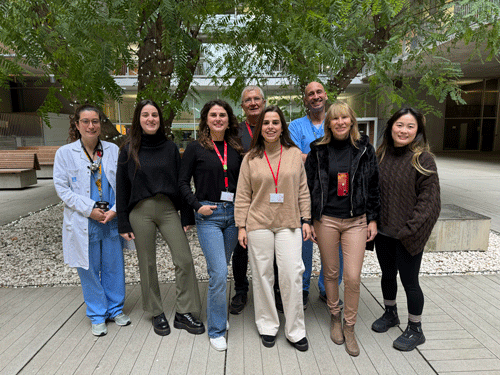
28 december 2023 - Press notes
An observational study conducted by researchers from Pompeu Fabra University and Hospital del Mar determines that the intradermal administration of the JYNNEOS vaccine against smallpox induces an efficient immune response that should protect people living with HIV from contracting the monkeypox virus.
An observational study conducted by researchers from Pompeu Fabra University and Hospital del Mar determines that the intradermal administration of the JYNNEOS vaccine against smallpox induces an efficient immune response that should protect people living with HIV from contracting the monkeypox virus.

Researchers from the Infection Biology Laboratory of the Department of Medicine and Life Sciences (MELIS) at Pompeu Fabra University and the HIV Unit of the Hospital del Mar Research Institute have demonstrated that intradermal vaccination with the JYNNEOS smallpox vaccine is the best option for protecting people with HIV from acquiring the monkeypox virus. This vaccine administration method requires less material to inject into each patient, multiplying the available vaccine doses by 5. This observational study also indicates that individuals with a low level of CD4 T cells - a type of white blood cell essential for effectively combating new infections - need a booster dose 28 days after the first dose to compensate for their immunosuppressed state.
Monkeypox virus is a zoonotic virus of the poxvirus family, related to the virus that causes smallpox. Monkeypox causes an infectious disease that can spread locally among humans through direct contact and respiratory transmission. The most common symptoms of this infection include fever, headache, muscle pain, swelling of lymph nodes, skin rash, respiratory and rectal symptoms, and exhaustion. The severity of the disease depends on age and the immune system's response to resist pathogens and parasites.
Before spring 2022, monkeypox typically appeared as isolated outbreaks in endemic areas of Central and West Africa. However, a global outbreak occurred at that time, facilitating person-to-person transmission, mainly among men who have sex with men. This population group had many individuals infected with HIV, making them particularly susceptible to monkeypox infection and its pathogenicity.
Although there is no specific vaccine for monkeypox, the smallpox vaccine protects 8 out of 10 people from contracting the infection due to the antigenic relationship between the two viruses.
Combatting Monkeypox in People Living with HIV
The results of the study published today in the Journal of Medical Virology indicate that the activity of T cells - responsible for the response against pathogens, immune system homeostasis, and memory - in individuals infected with HIV-1, whose viral load was controlled by antiretroviral therapy, increased after vaccination with the JYNNEOS smallpox vaccine. The T cell response was equivalent to that of healthy control individuals.
Among people living with HIV, there is a risk group that deserves special attention. These immunologically non-responding individuals (INR) control their viral load with antiretroviral therapy but only partially recover their CD4 T cell count.
"Our study shows that these INR individuals may need a booster dose 28 days after the first vaccination to generate an efficient T cell response and be protected against monkeypox," explains Robert Güerri, a clinician at Hospital del Mar and associate professor at UPF, who coordinated the vaccination study. Overall, the new findings highlight the importance of conducting specific studies on the immune response of people with HIV, especially those with a lower CD4 white blood cell count.
Vaccine Administration Routes Modulate Immune Response
Before the monkeypox outbreak in spring 2022, the JYNNEOS vaccine was administered subcutaneously to protect the population. However, due to increased vaccine demand, in August 2022, US and European health authorities proposed administering the JYNNEOS vaccine intradermally. Through this route, the vaccine is released into the upper layer of the skin, where many immune cells are present. Importantly, this new procedure multiplies vaccine doses by 5, increasing vaccine availability without compromising efficacy.
In contrast to the T cell response of individuals infected with HIV-1 who received the JYNNEOS vaccine subcutaneously, all individuals who received the vaccine intradermally generated a significant T cell response. Therefore, intradermal vaccination was more effective in activating specific antiviral immunity.
"Our results clearly support the proposal of a vaccination route that saves doses, especially for the protection of immunocompromised individuals, who need the vaccine the most," adds Andreas Meyerhans, ICREA researcher and professor at UPF, who coordinated the experimental part of the study.
This study provides an early indication of the best approach to preventive vaccination against monkeypox in a high-risk group of individuals. However, further studies will need to confirm and expand on the observations from this study, which involves a small number of vaccinated individuals.
Reference Article
Sisteré-Oró et al., Pan-pox-specific T cell responses in HIV-1-infected individuals after JYNNEOS vaccination. J Med Virol. 2023 Dec. DOI: doi:10.1002/jmv.29317
Parc Salut Mar
Passeig Marítim 25-29 Barcelona 08003
See location on Google maps
Phone: 93 248 30 00 · Fax: 93 248 32 54
Information request
© 2006 - 2025 Hospital del Mar · Legal notice and Privacy Police | Cookie Policy | Accessibility